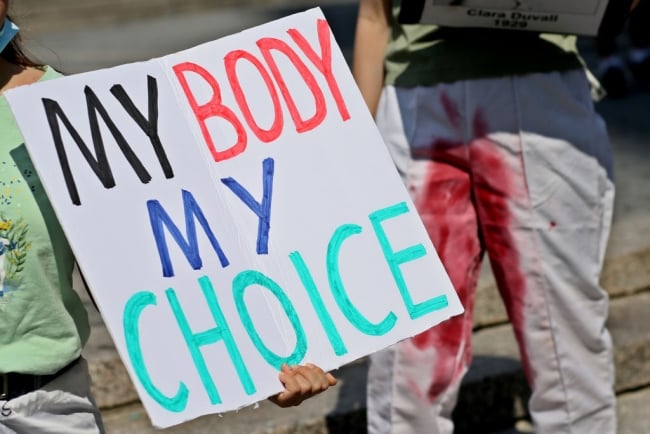You have /5 articles left.
Sign up for a free account or log in.

Abortion-rights protesters in New York’s Union Square on Labor Day.
Jenn Moreno/VIEWpress/Getty Images News/Getty Images North America
More than nine million undergraduate women returned to college having watched their human rights fall by the wayside over the summer when the Supreme Court overturned Roe v. Wade, eliminating the constitutional right to abortion. College counseling centers play a crucial role in this era of national crisis.
I have worked as a clinician for more than 10 years and assisted many college students through complex, challenging and unjust life experiences. However, it is of great concern to me that women’s legal rights across the nation have been taken away. I am shaken to the core by this.
Young adults, especially college students, are likely to be highly stressed by sudden restrictions on abortion, primarily since their generation always has accessed contraceptives and had the federal protections to abortion guaranteed under the Roe v. Wade decision in 1973.
Abortion access has significantly affected educational attainment for women in the U.S. Restricting abortion is harmful to educational and economic opportunities for women of color.
Furthermore, significant psychological distress is associated with the lack of autonomy around abortion decisions. This includes forced disclosure and waiting periods.
Researchers have found that women who receive a wanted abortion have better mental health outcomes than those denied. Further, those who carry unwanted pregnancies to term experience a higher rate of depression.
In addition to coping with reproductive choices, students need support dealing with the fear of legal prosecution, which many providers across the nation are also likely struggling with.
All individuals capable of becoming pregnant, regardless of gender, are affected, as are their sexual partners, friends, family members and caregivers.
The fact is that campus-based clinicians are skilled at helping students establish their own identities and beliefs, transition to independence, and manage their health care.
At a scale where thousands of students are in crisis, it is unlikely that college counseling centers will have the needed experience dealing with mental health issues related to abortion, postpartum disorders and parenting.
In an era when abortion denial, forced pregnancies, parental stress and postpartum mental health issues are rising, our nation’s colleges and universities must be ready.
Although the student is ultimately responsible for deciding whether to terminate a pregnancy, campus-based clinicians will have to advise on coping with the stigma and politicization associated with making these deeply personal decisions, as well as how to access the needed care from far fewer options.
The current political climate creates uncertainty among young adults, who fear being shackled to unwanted pregnancies. Our failure to act will leave students with little hope or practical support.
Colleges and universities must:
- Make it clear where they stand on reproductive care laws. Students must be informed about changes to reproductive health options that may affect their decision making and college experience.
- Provide comprehensive, ongoing professional development for counseling center clinicians on topics such as screening for postpartum depression and anxiety and reproductive counseling.
- Invest significantly and strategically in sexual health education and sexual violence prevention and response programs.
- Implement interventions proven to reduce unintended pregnancy and the need for abortion, such as offering no-cost contraceptives and promoting the use of long-acting reversible contraceptives, such as intrauterine devices and implants.
- Offer prenatal care, childbirth and parenting education, and childcare services on campus—or have a process for referring students to accessible, affordable, quality providers or educators off campus.
- Consider partnering with local rape crisis centers with in-depth experience supporting people through complex medical and legal decisions.
- Critically examine student health insurance policies (if offered) and look for opportunities to improve and expand coverage in areas likely to be most needed.
A clinician is responsible for supporting patients through their decisions and experiences as best as they can.
However, in a world where abortion and comprehensive reproductive care are restricted, we need a new, more practical approach. As I see it, it is as essential for us to be able to provide information, resources and safe referrals when students ask for them as it is to support students when they are coping with the emotional impact of these situations.




